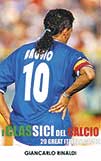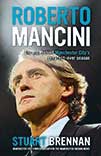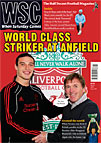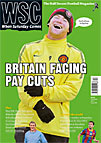Search: ' Fiorentina'
Stories
 by Giancarlo Rinaldi
by Giancarlo Rinaldi
Kindle via Amazon, £1.53
Reviewed by Matthew Barker
From WSC 318 August 2013
Giancarlo Rinaldi has been writing about Italian football since the late 1980s, initially in the Rigore! fanzine. This ebook is akin to a best-of; a simple enough framework, compiling reports on 20 games that the author has previously written about in various formats, the earliest dating back to 1961 (though not as an eye-witness) and the most recent from 2005, with an accent on the 1980s and 1990s. Some have a particular relevance for the outcome of a championship, though others have been chosen on more personal grounds.
Rinaldi has a nice and breezy, economic style, which keeps things moving along and works best when he’s explaining the contexts of club rivalries, or the back stories of an individual player or coach at a crucial moment in their careers. For anyone looking for a decent primer on the history of post-war Italian football, there’s much to enjoy here.
However, despite its slight size (less than 100 pages) this is definitely a book best dipped into. Those match reports soon start to blur a little and you could miss out on some nice details, especially when it comes to the quotes, the majority sourced from contemporary press cuttings. Inter’s Sandro Mazzola remembering when, as an 18-year-old, a club car was sent around to pick him up after he sat his accountancy exams and drive him straight to the stadium for a game against Juventus; the claims that jars of “Berlsuconi’s Tears” were sold on the streets of Naples after Napoli won the 1990 scudetto; Claudio Ranieri snapping at journalists after his Fiorentina team were on the receiving end of an 8-2 tonking from Zdenek Zeman’s Lazio.
If I have any gripes, and with a £1.53 asking price it seems pretty churlish to have any at all, it would be the lack of match summaries – a couple of lines of which could sit underneath the chapter headings. There’s no mention of the final score, let alone other stats (scorers, times, actual dates as opposed to simply the month, attendance figures), which can make things confusing when trying to follow the narrative of a report, especially if you are just dipping in. Some images would be nice too, though I appreciate we’re still in the relatively early stages of ebook technology. Hopefully, along with a sympathetic editing job, we can get to enjoy a more fully rounded reading experience one fine day when a print edition appears.
 The man behind Manchester City’s
greatest ever season
The man behind Manchester City’s
greatest ever season
by Stuart Brennan
Andre Deutsch, £16.99
Reviewed by Matthew Barker
From WSC 310 December 2012
Roberto Mancini was a gloriously gifted player. He was also stroppy; prone to outbursts and sulks that frequently alienated him from coaches of club and country and, occasionally, some of his team-mates. Now, as a manager himself, he has to deal with players who can comfortably outdo him on the ego and attitude fronts.
The first 100 pages or so of Stuart Brennan’s book are dedicated to Mancini the footballer, particularly his time at Sampdoria. Mancini’s contention that he was actually a midfield playmaker, rather than an out-and-out striker, caused him problems throughout his playing career. His great vision and unfailing talent for placing the ball where he wanted won him endless plaudits, but fallings out with a succession of Azzurri coaches and a surfeit of Italian attacking talent put the blockers on his international career.
Bar a few stand-out howlers – claiming the Calciopoli scandals took place “six years after” Italia 90, for one – the main problem here is the author’s drawn-out, clumsy theory that Mancini has always sided with the underdog, and that his notorious stubbornness is actually the stuff of an anti-establishment rebel (this despite him being a boyhood Juventus fan).
We are told that his move to Sampdoria in 1982, after a debut season with Bologna, “appealed to his sense of destiny” and that the Genovese club – a “provincial footballing backwater” apparently – provided the perfect platform for someone keen to topple the established Serie A order. And yes, it’s pretty obvious where we’re going with this one.
Less time is spent looking at Mancini’s time in Italy as a coach, which is a pity. The traumas of a first job in charge of Fiorentina, when the club were edging towards bankruptcy and demotion to the old Serie C, are dealt with in a few paragraphs, as is his equally troubled stint at Lazio. Brennan is itching to get to the bit where Mancini takes charge at Inter, so he can triumphantly point out that Nerazzurri are sort of, a bit, kind of like Manchester City. And Milan just like Manchester United. Perfect. Except, of course, they’re not.
The claim that il Mancio was sacked by an “ungrateful” and “impatient” Inter after three post-Calciopoli championship wins is hugely misleading. Most Italian commentators (and did Brennan really not think to speak to one?) believe the coach engineered his move away from the club and that his bluff was called after he reportedly told players he was going to Chelsea following Inter’s 2008 Champions League exit against Liverpool.
Instead of the promised insight and examination, we get a decidedly uncritical portrait; there is little analysis of the handling of Carlos Tévez. The relentless blandness of Mancini’s press conference quotes are interspersed with uninspiring, cut-and-paste retellings of events from the past couple of years, stuff that anyone with a passing interest in British football, never mind Manchester City supporters, surely knows well enough already.
We’re told those City fans are “in delirium”, some lucky ones are even “in ecstasy”, and surely no one can begrudge them that? Brennan sees his subject’s habitual grumpy aloofness as a positive, proof that he’s willing to fight his corner. However, a more searching assessment of Mancini, both as a man and a manager, could have flagged up warning signs of potential troubles ahead.
 While the big clubs claim conspiracy, Matthew Barker believes that Verona don’t receive enough credit for a famous title in the 1980s
While the big clubs claim conspiracy, Matthew Barker believes that Verona don’t receive enough credit for a famous title in the 1980s
The popular back story to Hellas Verona’s one and only Championship win, in 1985, tends to focus on the introduction of a new public balloting system for the selection of referees. Claims had been repeatedly made that the bigger clubs would block the use of certain unfavoured match officials. Juventus had just won two controversial scudetti in a row. Surely, the argument goes, it was no coincidence that the one season when referee selection was kept in check, a smaller team were able to take the top prize?
 Dear WSC
Dear WSC
I would like to ask my fellow readers if their clubs have something called “The Nardiello Factor”. The Nardiello Factor is a phenomenon where a striker’s popularity is based in a large part on the exotic nature of his name. At Barnsley we have seen no finer example of this than in recent months with the arrival of Jerónimo Morales Neumann. My fellow Tykes have been beside themselves at the thought of this player, and have wondered how Mark Robins can possibly limit him to just warming the bench. This opinion seems based on nothing more than the fact that he has a name that would be good to shout out when (if) he scores. Our Jerónimo accordingly scores a Nardiello Factor rating of nine (the maximum score is ten). Contrast this with Chris Woods, our loanee from West Brom. He scores a paltry NarFac rating of four. Were he to slightly change his name to Christiano Woodaldo he would up his NarFac rating to eight but, alas, this is not to my knowledge due for consideration. As a consequence the support from the terraces has been a little limited to date. Liam Dickinson scores a NarFac rating of one, though I am willing to concede that, even if he changed his name to Galileo Figaro Magnifico, he’d do well to register a NarFac rating of five. His yellow boots have had a negative impact.
Ian Marsden, Belper